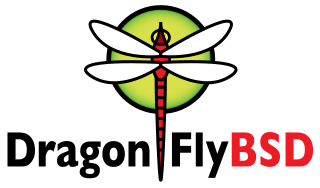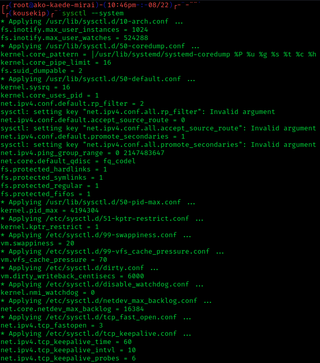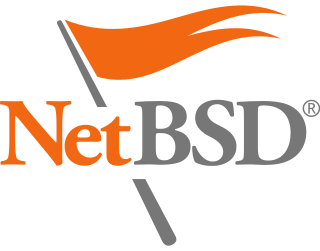| Written in | C |
|---|---|
| Operating system | NetBSD |
| Type | File system driver |
| License | BSD license |
Pass-to-Userspace Framework File System (puffs) is a NetBSD kernel subsystem developed for running filesystems in userspace. It was added to NetBSD in the 5.0 release, and was ported to DragonFly BSD in the 3.2 release.
In NetBSD 5.0, puffs includes refuse, a reimplementation of the libfuse high-level interface. [1] Some filesystems use the low-level libfuse interface or the kernel FUSE interface and they cannot be supported through refuse.
NetBSD 6.0 addresses that limitation through perfuse, a new compatibility layer that emulates the FUSE kernel interface. [2]

In computer science, a thread of execution is the smallest sequence of programmed instructions that can be managed independently by a scheduler, which is typically a part of the operating system. The implementation of threads and processes differs between operating systems, but in most cases a thread is a component of a process. The multiple threads of a given process may be executed concurrently, sharing resources such as memory, while different processes do not share these resources. In particular, the threads of a process share its executable code and the values of its dynamically allocated variables and non-thread-local global variables at any given time.
The Unix file system (UFS) is a family of file systems supported by many Unix and Unix-like operating systems. It is a distant descendant of the original filesystem used by Version 7 Unix.

DragonFly BSD is a free and open-source Unix-like operating system forked from FreeBSD 4.8. Matthew Dillon, an Amiga developer in the late 1980s and early 1990s and FreeBSD developer between 1994 and 2003, began working on DragonFly BSD in June 2003 and announced it on the FreeBSD mailing lists on 16 July 2003.

A virtual file system (VFS) or virtual filesystem switch is an abstract layer on top of a more concrete file system. The purpose of a VFS is to allow client applications to access different types of concrete file systems in a uniform way. A VFS can, for example, be used to access local and network storage devices transparently without the client application noticing the difference. It can be used to bridge the differences in Windows, classic Mac OS/macOS and Unix filesystems, so that applications can access files on local file systems of those types without having to know what type of file system they are accessing.
Unionfs is a filesystem service for Linux, FreeBSD and NetBSD which implements a union mount for other file systems. It allows files and directories of separate file systems, known as branches, to be transparently overlaid, forming a single coherent file system. Contents of directories which have the same path within the merged branches will be seen together in a single merged directory, within the new, virtual filesystem.
The Installable File System (IFS) is a filesystem API in MS-DOS/PC DOS 4.x, IBM OS/2 and Microsoft Windows that enables the operating system to recognize and load drivers for file systems.
Filesystem in Userspace (FUSE) is a software interface for Unix and Unix-like computer operating systems that lets non-privileged users create their own file systems without editing kernel code. This is achieved by running file system code in user space while the FUSE module provides only a bridge to the actual kernel interfaces.
The proc filesystem (procfs) is a special filesystem in Unix-like operating systems that presents information about processes and other system information in a hierarchical file-like structure, providing a more convenient and standardized method for dynamically accessing process data held in the kernel than traditional tracing methods or direct access to kernel memory. Typically, it is mapped to a mount point named /proc at boot time. The proc file system acts as an interface to internal data structures about running processes in the kernel. In Linux, it can also be used to obtain information about the kernel and to change certain kernel parameters at runtime (sysctl).

sysctl is a software utility of some Unix-like operating systems that reads and modifies the attributes of the system kernel such as its version number, maximum limits, and security settings. It is available both as a system call for compiled programs, and an administrator command for interactive use and scripting. Linux additionally exposes sysctl as a virtual file system.
In computing, ioctl is a system call for device-specific input/output operations and other operations which cannot be expressed by regular system calls. It takes a parameter specifying a request code; the effect of a call depends completely on the request code. Request codes are often device-specific. For instance, a CD-ROM device driver which can instruct a physical device to eject a disc would provide an ioctl request code to do so. Device-independent request codes are sometimes used to give userspace access to kernel functions which are only used by core system software or still under development.
The following tables compare general and technical information for a number of file systems.

FreeBSD is a free and open-source Unix-like operating system descended from the Berkeley Software Distribution (BSD), which was based on Research Unix. The first version of FreeBSD was released in 1993. In 2005, FreeBSD was the most popular open-source BSD operating system, accounting for more than three-quarters of all installed and permissively licensed BSD systems.

NTFS-3G is an open-source cross-platform implementation of the Microsoft Windows NTFS file system with read/write support. NTFS-3G often uses the FUSE file system interface, so it can run unmodified on many different operating systems. It is runnable on Linux, FreeBSD, NetBSD, OpenSolaris, illumos, BeOS, QNX, WinCE, Nucleus, VxWorks, Haiku, MorphOS, Minix, macOS and OpenBSD. It is licensed under the GNU General Public License. It is a partial fork of ntfsprogs and is under active maintenance and development.

NetBSD is a free and open-source Unix operating system based on the Berkeley Software Distribution (BSD). It was the first open-source BSD descendant officially released after 386BSD was forked. It continues to be actively developed and is available for many platforms, including servers, desktops, handheld devices, and embedded systems.

The NetBSD rump kernel is the first implementation of the "anykernel" concept where drivers either can be compiled into or run in the monolithic kernel or in user space on top of a light-weight kernel. The NetBSD drivers can be used on top of the rump kernel on a wide range of POSIX operating systems, such as the Hurd, Linux, NetBSD, DragonFly BSD, Solaris kernels and even Cygwin, along with the file system utilities built with the rump libraries. The rump kernels can also run without POSIX directly on top of the Xen hypervisor, an L4 microkernel using the Genode OS Framework or even on "OS-less" bare metal.
The hw.sensors framework is a kernel-level hardware sensors framework originating from OpenBSD, which uses the sysctl kernel interface as the transport layer between the kernel and the userland. As of 2019, the framework is used by over a hundred device drivers in OpenBSD to export various environmental sensors, with temperature sensors being the most common type. Consumption and monitoring of sensors is done in the userland with the help of sysctl, systat, sensorsd, ntpd, snmpd, ports/sysutils/symon and GKrellM.
The envsys framework is a kernel-level hardware monitoring sensors framework in NetBSD. As of 4 March 2019, the framework is used by close to 85 device drivers to export various environmental monitoring sensors, as evidenced by references of the sysmon_envsys_register symbol within the sys path of NetBSD; with temperature sensors, ENVSYS_STEMP, being the most likely type to be exported by any given driver. Sensors are registered with the kernel through sysmon_envsys(9) API. Consumption and monitoring of sensors from the userland is performed with the help of envstat utility through proplib(3) through ioctl(2) against the /dev/sysmon pseudo-device file, the powerd power management daemon that responds to kernel events by running scripts from /etc/powerd/scripts/, as well as third-party tools like symon and GKrellM from pkgsrc.
A virtual kernel architecture (vkernel) is an operating system virtualisation paradigm where kernel code can be compiled to run in the user space, for example, to ease debugging of various kernel-level components, in addition to general-purpose virtualisation and compartmentalisation of system resources. It is used by DragonFly BSD in its vkernel implementation since DragonFly 1.7, having been first revealed in September 2006, and first released in the stable branch with DragonFly 1.8 in January 2007. The long-term goal, in addition to easing kernel development, is to make it easier to support internet-connected computer clusters without compromising local security. Similar concepts exist in other operating systems as well; in Linux, a similar virtualisation concept is known as user-mode Linux; whereas in NetBSD since the summer of 2007, it has been the initial focus of the rump kernel infrastructure.